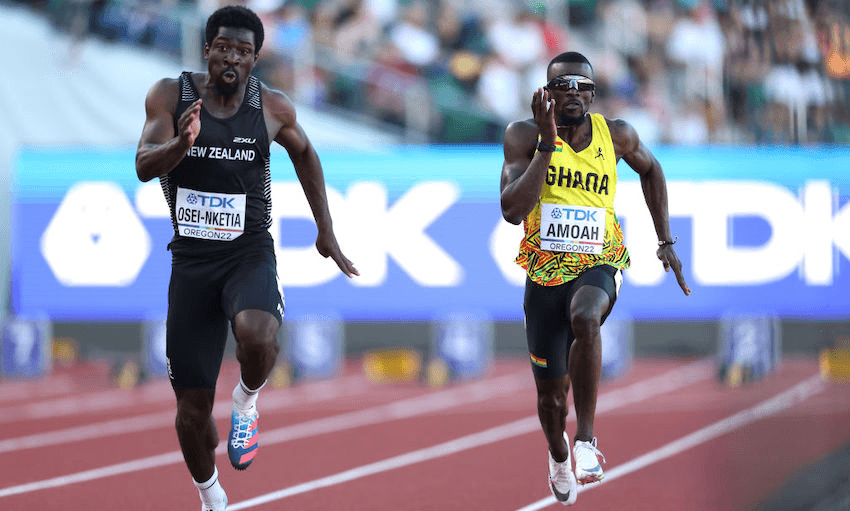Record-breaking runner Eddie Osei-Nketia could have won a 100m medal for his country, his coach says.
This story was first published on Stuff.
The coach of the fastest man in New Zealand history has called for an urgent review of Athletics New Zealand’s selection criteria for the Commonwealth Games after witnessing another sluggish men’s 100m final.
Gary Henley-Smith believed his star runner Eddie Osei-Nketia could have won a medal in the iconic sprint event had New Zealand selected the record-breaking 21-year-old, who last month smashed his father’s long-standing national record at the world championships in Eugene.
Osei-Nketia needed to run one A standard time of 10.07 or two B standard times of 10.12 to meet New Zealand’s selection criteria for the Commonwealth Games but he left his run too late, clocking his record-breaking 10.08 (which would have been a second B standard time) when the deadline had already passed.
But Henley Smith said administrators at Athletics NZ have been left with egg on their face after Thursday’s 100m final for setting standards that were too “unrealistic” as 10.08 would have won Osei-Nketia a silver medal had he been there and matched his personal best.
In fact, 10.08 would have been good enough to win a silver medal at each of the last six Commonwealth Games dating back to Manchester 2002.
Osei-Nketia is the only New Zealander to ever run a legal time under 10.10.
“What are the administrators doing? Are they going to review what has happened? There needs to be questions asked of the administrators of the sport,” Henley-Smith said.
“10.08 last time was a silver medal and again if he had run 10.08, he would have got a silver medal so why is the standard 10.07? That’s a really interesting question that needs to be asked of Athletics New Zealand.
“I feel sorry for him because he chose to represent New Zealand but if he was in Australia he’d be running for Australia at all of these things.”
In May, Athletics NZ high performance manager Scott Newman agreed the qualifying standards for male sprinters were “really tough” but Osei-Nketia “simply hadn’t run fast enough” last summer.
His two fastest times in the qualifying period were 10.12 in Brisbane last year, and 10.19 in Adelaide earlier this year. “There were no extenuating circumstances that could get him nominated on that basis,” Newman said in May.
Osei-Nketia also missed out on last year’s Tokyo Olympics as he did not meet the New Zealand Olympic Committee’s requirement of proving he was capable of a top-16 finish.
His personal best at the time, 10.12, would have put him 0.01 seconds outside the top 16 in 17th.
Kenya’s Ferdinand Omanyala, who Osei-Nketia beat during the heats at the world championships, won the 100m final at the Commonwealth Games in 10.02 seconds, with South Africa’s Akani Simbine finishing second in 10.13 and Sri Lanka’s Yupun Abeykoon third in 10.14.
The final was run into a 0.9m/s headwind which influenced the times recorded, but the field was also much weaker than at the world championships, where Osei-Nketia broke the national record in his heat to pip Omanyama.
As the two events were held so close together many world-class sprinters from Commonwealth countries, including the likes of Canada and Jamaica, elected to prioritise the world championships and more lucrative grand prix races, and in Botswana’s Lestile Tebogo’s case even the under-20 world championships.
The day before the Commonwealth final took place, teenager Tebogo set a blistering under-20 world record time of 9.91 seconds – faster than Usain Bolt at that age – that would have easily won him gold in Birmingham.
Simbine was the only one of the eight finalists from the men’s 100m at the senior world championships to compete at the Commonwealth Games.
Osei-Nketia qualified for the world championships by being ranked among the top 48 sprinters in the world but Henley-Smith questioned why it was so much harder to qualify for the Commonwealth Games when the biggest names in the sport were not there.
He feared Osei-Nketia and other talented sprinters could be lost to athletics if they were not given the opportunity to compete on the world stage.
“It’s a pretty sad affair to be honest with what is happening with Eddie,” he said.
“You talk about the pressure of not actually making it, but he’s New Zealand’s fastest ever and he’s not even there.
“These kids have only got a short window and you can understand why they are feeling so dejected about the sport that they are in at the moment.”




